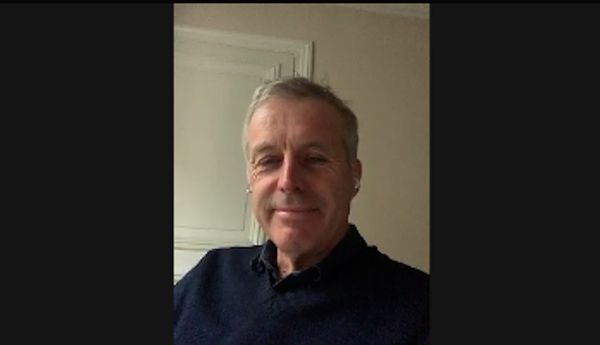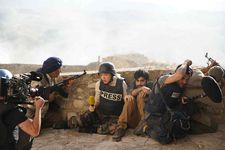 |
| Bruno Dumont on the Bertolt Brecht quote “If the people and the party disagree, dissolve the people” in France: “That sentence we owe to the journalist.” Photo: Anne-Katrin Titze |
In the second instalment with Bruno Dumont on France, we discussed the clothes worn by Léa Seydoux (again with his longtime costume designer Alexandra Charles - Joan of Arc, Slack Bay, Li'l Quinquin, Camille Claudel, 1915, Outside Satan, Hadewijch, Flanders), a scene with France and Charles Castro (Emanuele Arioli) in the Alps, repetition and resemblance, the internal self of France (Seydoux) and a song with Christophe, a moment of grace and the cinematic expression of the narrative.
France never wears the same expensive designer outfit twice. The slinky jewel-tone dresses, the short skirts, and luxurious turtlenecks are juxtaposed with the army fatigues and headscarves just so to emphasize the two sides of her job that are in conflict. France’s son Jojo (Gaëtan Amiel) is beholden to his phone and gives tokens of affection only for money or TV access. The family lives in an apartment that resembles an art-filled morgue, where the living dead gather to talk about her novelist husband Fred (Benjamin Biolay) and the author photo he chose for his latest novel essay book. She earns five times more than he does, which for Fred justifies all his anger.
We know that anything is possible since in an early scene with clever editing the real Emmanuel Macron had an interaction with the faux France. France seeks refuge in her retreat to a sanatorium in the Alps and finds it in a stranger, Charles Castro, who says he teaches Latin, doesn’t know her fame, and sings to her about the coming apocalypse. His chant in the snow is a classic Dumont moment that triggers an emotional switch. It is surprising, disturbing and sublime. Everything becomes bigger, reaches another realm and then, maybe, doesn’t. I am not exactly sure what to make of France, the film. The anger and the lies, the way we see that the news isn’t news and love isn’t love, a child isn’t a child and a friend isn’t a friend.
The camera often rests on Seydoux’s face as she is staring into nothingness, crying fake or real tears, which may be the same. The music (by Christophe), as always with Dumont, carefully placed, oscillates between Hitchcockian elegance, wailing scream and ticking time bomb. In T.S. Eliot’s The Love Song of J Alfred Prufrock, “In the room the women come and go / Talking of Michelangelo.” In the TV studio in France, the politicians and journalists come and go and talk of Bertolt Brecht and look alike and feel alike.
 |
| Bruno Dumont on France (Léa Seydoux) with Charles Castro (Emanuele Arioli) in the Alps: “These parts in the mountain are indeed extraordinary fabulous moments where we feel emotion dawning.” |
And France, with the Deneuve hair and the silk blouses, smiles and says, “It’s my style” and amen. “Let’s go to Dior,” suggests Lou (Blanche Gardin) with her smirk, and let’s pretend that you’re vegan so that the Ambassador doesn’t serve you the dreaded ortolans. The first time we see France in a “war zone” she snaps at the person she interviews as if he were an unruly, slightly stupid puppy. The limited number of homeless people she feeds once in a blue moon as a publicity stunt annoy her, and the woman who lived with a monster for 20 years leaves her cold. Is there a soul there and how do we get to it?
From France, Bruno Dumont joined me on Zoom for an in-depth conversation on France, a highlight of the 59th New York Film Festival in the Main Slate programme and my pick in the IndieWire Year-end Critics Poll for Best Screenplay and second Best Film, just behind Leos Carax’s Annette.
Anne-Katrin Titze: I want to move on to the costumes, which are such a departure from your previous films where they were settling us into a time period but not really. Here in France, Léa Seydoux wears no designer outfit twice. As much as I love nice clothes on film, here it becomes flattened. It’s as if what we can do with clothes, with costumes, which is a reinvention, doesn’t work anymore and becomes flattened out. I would like you to comment on the clothes, if that makes sense?
Bruno Dumont: Well, in a way the costumes are doing the same work that the music is doing on its end. They are participating in the cinematic expression of the narrative. The costumes here are expressing a very sophisticated character, which probably explains this flattening that you’re feeling. She’s a very complex character, she’s a star, she’s extremely artificial in her appearance.
 |
| Bruno Dumont on France (Léa Seydoux): “She’s a very complex character, she’s a star, she’s extremely artificial in her appearance.” |
It’s like her apartment, everything is oversized. So her way of dressing is out of phase, disproportionate, it’s false in terms of what she actually represents. The costumes are like a negative function of the expression of the character. Because what’s interesting to me about the character is not her exterior but her internal self. It was very useful and interesting to have these extravagant costumes that don’t actually reflect her internal self. Her outside is false, a mystification.
AKT: That makes perfect sense. That explains a lot, thank you. There is a moment in the Alps when the Charles Castro character starts chanting about the apocalypse. Although it turns out to not be what we think it is, this is a very disturbing, profound, sublime moment. You have that in several of your films, when suddenly something shifts. To me as a viewer it became bigger and then again scales back. It connects to the apocalypse and also, I would say, to the apartment France and her family live in, which resembles a morgue - so there is the idea of death.
BD: The actor who plays Charles Castro is a non-professional, he’s an amateur. When I do casting, I always try to discover the person and the abilities and capacities this person might have. So in case of this actor, he’s a teacher or professor who teaches old French in the university and he can sing in Latin. I found this very interesting. I’m in the habit of using people’s capacities, using this good fortune that comes my way in the films, so I chose to make him sing.
 |
| The first time we see France (Léa Seydoux) in a “war zone” she snaps at the person she interviews as if he were an unruly, slightly stupid puppy. |
As it happens, Léa Seydoux had also worked a little bit with Christophe on a song. We didn’t get very far unfortunately, but she had worked on an a-cappella song with him that we hear in the film. So these parts in the mountain are indeed extraordinary fabulous moments where we feel emotion dawning. Where we feel France is on the edge of love and also on the edge of death. The moment where I had them sing was quite improvised and it’s a moment where the sung voice goes beyond what words could express.
They could have said I love you to each other, but no, instead they sing. So what is happening here again is film as a transfiguration. It’s representing the human heart in its deepest sense; indeed that moment of singing in the mountain is a moment of grace.
AKT: Indeed. I have been quoting one sentence of yours from Ma Loute, Slack Bay, ever since, which is “We know what to do but we do not do.” It’s hilarious in the film and fits so well in so many situations. Do you think it fits for France as well? Does she know what to do but does not do?
BD: Yes, I think that sentence goes for all of us. It’s the tragedy of existence. We know what is good but we don’t do it. This is through the vicissitude of existence, what we know is good we do not do. It’s also what St. Paul said in that beautiful sentence. It expresses all of the duplicity of the soul. The knowledge that it has and yet its inability, its failings. You know, in the lies that politicians tell, lies that ideologists tell - this is our tragedy. It’s not France’s tragedy, it’s ours. We know what to do, but we don’t do it.
 |
| Bruno Dumont on France (Léa Seydoux): “What’s interesting to me about the character is not her exterior but her internal self.” |
AKT: Another sentence - which is almost lost in France, because the politicians and journalists come and go. They reminded me of T.S. Eliot’s women who come and go, speaking of Michelangelo. One of them quotes Bertolt Brecht “If the people and the party disagree, dissolve the people.” It’s something you have to capture out of the film, but is very important.
BD: That sentence we owe to the journalist. Because, as you know, I work a lot with improvisation and in this case he brought that sentence, so it belongs to him. It’s a very interesting sentence but I think an even more interesting one is one that France repeats in the film, which is that life, though it does not repeat itself, always resembles itself. It’s this perpetual change that we have through existence but actually it’s just a repetition. You would think that’s Proust, but no, it’s not Proust.
AKT: I love the way that is phrased. Yes it resembles itself. Sometimes one may wish for a repetition, but all we get is resemblance that is faded.
Read what Bruno Dumont had to say on Charles Péguy, the nature of the character of Lou, played by Blanche Gardin, composer Christophe, the psychological role of music as used by Alfred Hitchcock, and going into space.
France opens theatrically in the US at Film at Lincoln Center on December 10.






















